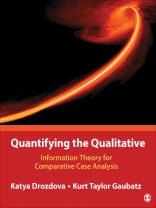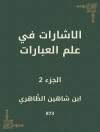Quantifying the Qualitative presents a systematic approach to comparative case analysis based on insights from information theory. This new method, which requires minimal quantitative skills, helps students, policymakers, professionals, and scholars learn more from comparative cases. The approach avoids the limitations of traditional statistics in the small-n context and allows analysts to systematically assess and compare the impact of a set of factors on case outcomes with easy-to-use analytics. Rigorous tools reduce bias, improve the knowledge gained from case studies, and provide straightforward metrics for effectively communicating results to a range of readers and leaders.
Cuprins
CHAPTER 1: Enhancing Small-n Analysis: Information Theory and the Method of Structured-Focused Comparison
Why Quantify the Qualitative? Enhancing Qualitative Analysis With Information Theory
Who Needs to Quantify the Qualitative?
Information and Action Under Uncertainty
Origins and Motivations
From Cryptography and Communication to Comparative Case Studies
Making Qualitative Analysis of Information Systematic: The Method of Structured-Focused Comparison
Information Theory and Metrics for Qualitative Learning
A Roadmap for Quantifying the Qualitative
Conclusion
CHAPTER 2: The Information Revolution
Information Theory for the Information Age
What’s Under the Hood: A Primer A Primer on Logarithms and Probability for Small-n Analysis
Information Uncertainty Measures
Fundamental Contributions of Information Theory
The Growing Use of Information Metrics
A Note for Practitioners: From Analytics to Action
Conclusion
CHAPTER 3: Case Selection
Research Design and Information Theory
Case Selection Strategies and Challenges
Coding Cases
Case Selection and the Advantages of Information Theoretic Analysis
Conclusion
CHAPTER 4: The Information Method—If You Can Count, You Can Do It
Quantify: Setting up a Truth Table for Comparative Case Analysis
Count: Calculating the Probabilities
Compute: Computing the Uncertainty Measures
Compare: Understanding the Outcomes
Conclusion
CHAPTER 5: Information Metrics at Work—Three Examples
Example 1—Ecology: Information Analysis for Tropical Forest Loss
Example 2—Education: Accounting for Teaching Quality
Example 3— Medicine: Effective Nursing Care
Conclusion
CHAPTER 6: Sensitivity Analysis—Entropy, Inference, and Error
Confidence Intervals and the Information Metric
Analytic Leverage for a Study of Environmental Incentives
The Information Metric and the Problem of Inference
Sensitivity Analysis
Dropped-Case Analysis
Outcome Coding Sensitivity
Conclusion
CHAPTER 7: The QCA Connection
Understanding Qualitative Case Analysis (QCA)
QCA and Causal Complexity
Where QCA and Information Metrics Differ
Examples of Enhancing QCA with Information Metrics
Conclusion
Selected Introductory QCA Resources
QCA Software and Web Resources
CHAPTER 8: Conclusion
Information, Research, and the Digital Era
Reducing Uncertainty and Improving Judgment: Using Information Analysis in the Real World
The Limits and Further Possibilities for Information Analysis
Extensions
Conclusion
APPENDIX A: Using Excel for Information Metrics
Step One: Enter Data
Step Two: Probability Calculations
Step Three: Entropy and Mutual Information Metrics
APPENDIX B: Using R for Information Metrics
Example 1: Deriving Information Metrics from Conditional Probabilities
Example 2: Deriving Information Metrics with the abcd Method
References
Index
Despre autor
Kurt Taylor Gaubatz, Ph D, is an associate professor in the Graduate Program in International Studies at Old Dominion University. In addition to courses in international relations and international law, he regularly teaches research methods and advanced statistics. He has previously taught methodology and formal modeling as a faculty member at Stanford University and at Oxford University (Nuffield College), where he was the visiting John G. Winant Lecturer in American Foreign Policy. He has also served as the Susan Luise Dyer Peace Fellow at the Hoover Institution at Stanford University, and received a Pew Faculty Fellowship from the Kennedy School of Government at Harvard University. Professor Gaubatz’s most recent book is A Survivor’s Guide to R (SAGE 2015), which is a broad and cross-disciplinary introduction to the R language for statistical programming. He is also the author of Elections and War (Stanford University Press, 1999), which is a study of the electoral politics of military conflict. His work on international law and on the relationship between domestic politics and international relations has appeared in a number of leading journals. His work on political modeling has received funding from the US Department of Defense.Professor Gaubatz earned an AB in economics from U.C. Berkeley, an MALD in international law from the Fletcher School of Law and Diplomacy, an MDiv in theology from Princeton Theological Seminary, and a Ph D in political science from Stanford University. More information can be found at kktg.net/kurt.












